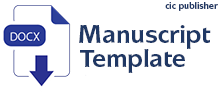| ISSN |
| Manuscript Template |
| Make a Submission |
| Publisher |
| In Partnership with |
| People |
| Editorial Team |
| Peer-Reviewers |
| Contact |
| Policies |
| Focus and Scope |
| Peer Review Procces |
| Publication Ethics and Malpractice Statement |
| Publication Frequency |
| Open Access Policy |
| Repository Policy |
| Screening for Plagiarism |
| Correction and Retraction |
| Copyright and Licensed |
| Indexing and Abstracting |
| Allegations of Misconduct |
| Generative AI Policy |
| Archiving Policy |
| Revenue Source |
| Advertising |
| Direct Marketing |
| Submission |
| Author Guidelines |
| Online Submission |
| Privacy Statement |
| Article Publication Charge |
| Information |
| For Readers |
| For Authors |
| For Librarians |
| Indexing and Abstracting |
| Recommended Tools |

| Journal Metrics |
| Acceptance Rate : | 35 % |
| Review Speed : | 40 days |
| Issue Per Year : | 2 |
| Number of Volumes : | 3 |
| Number of Issues : | 5 |
| Number of Articles : | 50 |
| No. of Google Citations : | 497 |
| Google h-index : | 14 |
| Google i10-index : | 21 |
| Abstract Views : | 12.458 |
| PDF Download : | 6.537 |
UPDATE: October 11, 2025
| Visitor |

.png)


.png)
.png)
.png)











